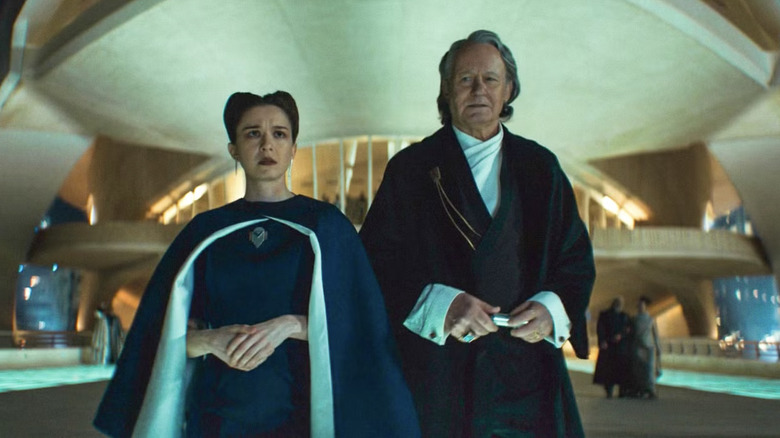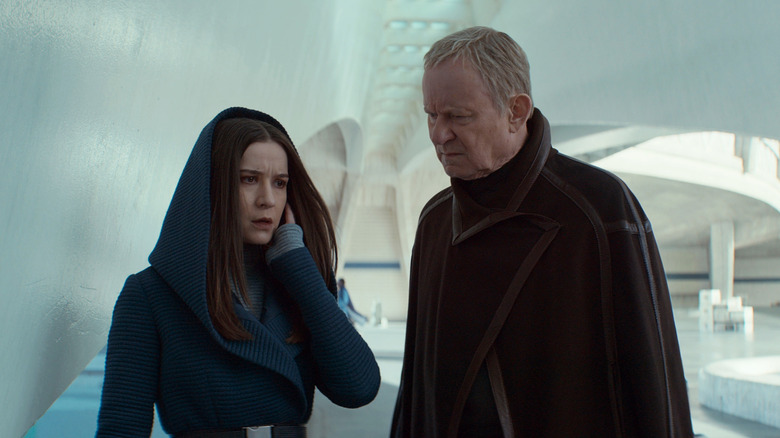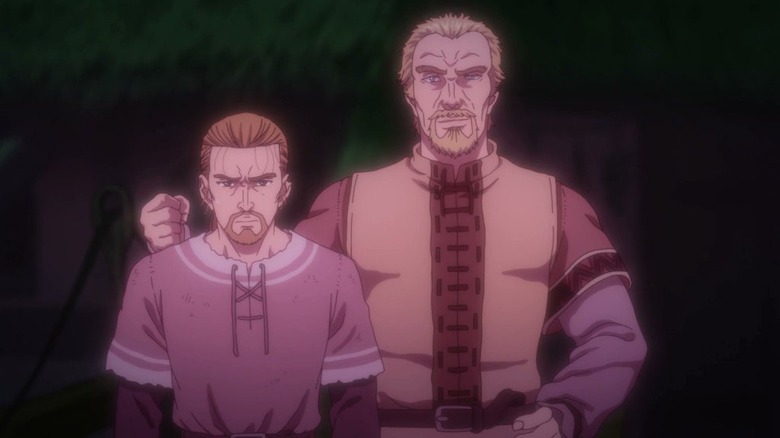Why Andor Star Elizabeth Dulau Doesn't See Luthen And Kleya As Father And Daughter
When we first meet rebel leader Luthen Rael (Stellan Skarsgård) in "Star Wars: Andor," he's helping Cassian Andor (Diego Luna) escape the Ferrix police and recruiting him for a heist job. Then we see Luthen lives a double life, working as a luxury antiques dealer on Coruscant, the capital of the Empire he's fighting. Kleya Marki (Elizabeth Dulau) is Luthen's assistant in both halves of his life.
So from the beginning, Luthen has had an air of mystery; we see early on that he wears one mask (well, a wig) so are there others? In "Andor" season 1 episode 8, "Narkina 5," Saw Gerrera (Forest Whitaker), a radical anti-Imperialist, asks Luthen what his ideology is. Luthen answers he's a "coward" who's afraid of letting the Empire grow unbeatable. Ok, but that's not really answering the question. What made him so afraid in the first place?
For that matter, how did Luthen and Kleya forge such an unbreakable trust, where they're both so willing to sink into extremes to destroy much greater evil? "Andor" revealeded Luthen's even darker-than-expected backstory in his final episode, season 2's "Make It Stop." He was once an Imperial soldier named Lear. He took part in at least one massacre (and maybe more) and discovered a young girl (April Woods) hiding for her life in his ship. His already shaky faith in the Empire shattered and he deserted, taking the girl with him. One guess what her name was.
In an exclusive interview with /Film, "Andor" creator Tony Gilroy said that Skarsgård did not want Luthen's motivation as a rebel to be revenge. So, as Skarsgård himself explained in the behind-the-scenes featurette "Andor Season 2 Declassified: Farewell," Gilroy had an epiphany: "It's [Kleya's] revenge."
Kleya hates Luthen too much to forgive him
In further flashbacks during "Make It Stop," we see how Luthen taught Kleya to be a rebel. Kleya has sworn to destroy the Empire and Luthen helps her because he owes her more than he can repay. But even though Luthen raised Kleya, Dulau has said consistently across interviews that she doesn't see their bond as father and daughter.
Speaking to the Hollywood Reporter, Dulau acknowledged comparisons between Luthen and Kleya's flashback storyline and "The Last of Us." However, she also finds the "Andor" story "much darker." Joel (Pedro Pascal) and Ellie's (Bella Ramsey) relationship, for all its complexities, is ultimately one of love. With Luthen and Kleya, it's not so simple. In "Andor Season 2 Declassified," Dulau elaborated:
"It is not a father-daughter relationship. For it to become that, it would mean that Kleya forgives [Luthen] for having [helped kill her family]. There are parts of Kleya that really hate this man."
Notice Dulau says parts of Kleya hate Luthen. There are also parts of her that love him, but that love could never be pure like a parent and child's should be. Luthen, too, could probably never look at Kleya without feeling guilt. Their last scene together underlines the contradictions. Kleya kills an imprisoned Luthen to silence him, showing loyalty to her vengeance above all else, but she does so with a broken heart and a last kiss on his forehead.
Kleya isn't the only orphan with a problematic guardian
According to Dulau (via the Hollywood Reporter), one movie that Gilroy pulled from for the Luthen & young Kleya flashbacks was Peter Bogdanovich's 1973 "Paper Moon." Con artist Moze Pray and his (maybe) daughter Addie Loggins (real-life father and daughter Ryan and Tatum O'Neal) drive across Kansas together and pull scams along the way. As with "The Last of Us" comparison, Dulau thinks that Luthen and Kleya's bond is much darker than Moze and Addie's.
One comparison she might find closer comes from the horror-thriller anime "Monster" (based on a manga by Naoki Urasawa). In "Monster" episode 9, our hero Dr. Kenzo Tenma is taking firearms lessons from Hugo Bernhardt, a retired mercenary. Bernhardt has a silent young girl living with him — but she's not his daughter. During an operation in Myanmar, he killed the girl's mother, then brought her home so she'd have someone to raise her. Though Bernhardt admits the girl will probably hate him for the rest of her life, at the episode's end they're at least able to enjoy a warm meal together.
Another manga/anime that makes such a relationship not a side plot but the whole story is "Vinland Saga," a Viking-era historical epic by Makoto Yukimura. The lead of "Vinland Saga" is Thorfinn , a teenage warrior fighting in a Viking band led by the devious Askeladd. Thorfinn's own father, Thors, was murdered by Askeladd. Thorfinn serves Askeladd not due to loyalty, but hatred; he wants to earn a proper duel with his father's murderer. Blinded by his rage, Thorfinn only realizes much later that during all the childhood years he spent trying to avenge his father, Askeladd was his father. But that doesn't mean Thorfinn could completely forgive and forget, the same way Kleya couldn't for Luthen.
"Star Wars" is about a lot of things, but the main nine films at least have retroactively become a family saga, starting with Darth Vader's reveal that he's Luke Skywalker's father in "The Empire Strikes Back." In "Return of the Jedi," Luke's arc is all about the conflict between the father he idolized also being someone who has hurt and terrified him so much — and whether he can reconcile that by pulling Vader back to the light.
"Andor" may shirk a lot of "Star Wars" clichés (including the clear divide between light and dark) but its exploration of a complex parental relationship is more than true to the series' traditions.
"Andor" is streaming on Disney+.


